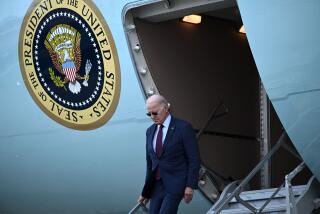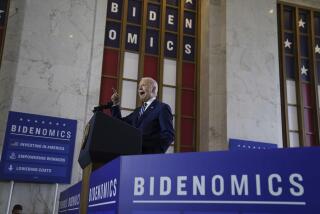Reagan Calls Economy Sound, Assails ‘Tax-and-Spend Mentality’
WASHINGTON — President Reagan said Saturday that the U.S. economy is “solid and accelerating again,” but warned of the possibility that “the tax-and-spend mentality will return to Washington and take us back to those bad old days of sky-high taxes, double-digit inflation and 21.5% interest rates.”
The implication, in the President’s weekly radio address, was that economic progress he attributes to his Administration’s policies will be threatened if Democrats, who control the House, also win a majority of the Senate in the Nov. 4 elections.
However, Reagan named no names, identified no party and never mentioned that a new Congress will be picked in just nine days. He accentuated positive aspects of the Administration’s recent record and predicted: “We’re going to keep the good times rolling until they extend to every single corner of the nation.”
A dissenting view came from Robert S. Strauss, chief trade negotiator under former President Jimmy Carter and former Democratic national chairman. In a response for the Democratic Party, Strauss maintained that the President “didn’t even mention our most serious problem--how, under his policies, America has become the world’s largest debtor nation.”
“We have no effective trade policy and the Reagan Administration does little or nothing but plead that we be patient and not offend our trading partners,” Strauss said.
Strauss called for a “progressive trade policy” that will make U.S. trading partners “understand that when their ships enter our harbors with their products, we expect our ships with ‘Made in the U.S.A.’ labels to be able to enter theirs.” To assure such an approach, he said, “we need a Democratic Senate and House of Representatives.”
Reagan said that the 2.4% growth rate for the third quarter, reported Wednesday by the Commerce Department, means “that our economy is solid and accelerating again.” He conceded that “some sectors . . . are not yet sharing fully in the expansion,” but added: “Indications are that our economy is gathering momentum for even more growth, more job creation, a narrowing trade deficit and continued low inflation in the months ahead.”
Without naming Carter, his predecessor, Reagan asked his listeners to “contrast this with the economic mess we inherited 5 1/2 years ago. It’s not for nothing those are called the days of malaise.”
Reagan gave principal credit for economic improvement to the tax cuts he pushed through Congress in 1981.
More to Read
Inside the business of entertainment
The Wide Shot brings you news, analysis and insights on everything from streaming wars to production — and what it all means for the future.
You may occasionally receive promotional content from the Los Angeles Times.










